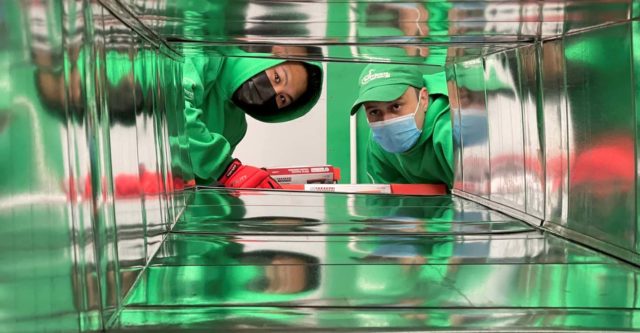A recent survey of homeowners and HVAC contractors found that homeowners may shy away from obtaining a quote from a contractor who charges a fee for an assessment visit. If the homeowner were to obtain the quote, the maximum fee they’d be willing to pay would be about $50. While less than a third of the contractors surveyed currently charge an assessment visit fee, those who do are charging about $112.
The survey was conducted in March 2023 by Clear Seas Research, the research unit of BNP Media, parent company of The ACHR NEWS. It’s comprised of 400 homeowner responses and 104 contractor responses.
Specifically, when asked how likely they’d be to obtain a quote from an HVAC contractor that charged a fee for a visit to assess equipment before giving the quote, only 4% of homeowners responded that they definitely would go with that company. Nine percent said they probably would, 28% said they may or may not, 38% responded “probably not,” and 22% said they definitely would not.

Sample Sizes: 2023 = 104
MAX FEE: 39% of homeowner’s surveyed said they’d be willing to pay at most $50 for an assessment of their HVAC equipment. (Courtesy of Clear Seas Research)

Sample Sizes: 2023 = 225
CONTRACTOR FEE: 71% of contractors surveyed said they don’t currently charge a fee to assess a homeowner’s HVAC equipment. (Courtesy of Clear Seas Research)
Striking a Balance
Chris Petri, operations manager at Petri Plumbing & Heating in Brooklyn, New York, said there’s a happy medium between whether or not charging a visit fee affects a homeowner’s likeliness in obtaining a quote.
“In our experience, having no/low fees can actually create a poor perception of quality for a client, as it starts a narrative of no/low fees for no/low value,” Petri said. “At the same time, clients do enjoy getting multiple quotes from multiple companies to compare, and this would be tough with high fees.”

MORE THAN A VISIT: Daffy Ducts technician Ron C. seals contaminated duct liner at a local university. (Courtesy of Daffy Ducts)

THOROUGHNESS: Technician B. Wright takes time to properly remove and restore registers while protecting the customer’s home. (Courtesy of Daffy Ducts)
Currently, Petri Plumbing & Heating charges a visit fee of $89 plus tax. However, if the client decides to move forward with any of the options presented during the assessment, they waive the visit fee.
“In order to formulate our visit fee, we took the average time from beginning of an evaluation to the completion of an evaluation for over 1,000 jobs and formulated a dollar amount based on that time and our overhead,” said Petri.
Petri noted that there are definitely also generational trends in response to visit fees.
“The past generations are much less interested in obtaining a quote that has a cost, while the newer generations see the value in the visit and therefore understand there is a cost,” Petri said.
Just Tarr, owner of Daffy Ducts in Atlanta, Georgia, pays his technicians hourly. Their visit fee is similar to Petri Plumbing’s in that it has the opportunity to be waived, but differs because there isn’t always one charged, and it’s not called a “visit fee.”
Daffy Ducts president Justin Tarr discusses Daffy Ducts’ policy on charging fees to assess equipment, and the success he’s seen.
Normally, Daffy Ducts’ process involves quoting over the phone, which makes sense for an IAQ business that services mostly residential jobs that are relatively similar. In the situations in which Daffy Ducts does have to charge a fee for an assessment, it’s called an “inspection fee.”
“We believe that when we do charge that fee, there should be value that comes with that, not just a fee for us to show up,” said Tarr. “And the value for us is a full inspection report.”
What the customer then ends up paying for is a full inspection report with photos outlining everything the tech found that the homeowner would need to know to make an educated purchase decision.
If they choose the services of Daffy Ducts, that inspection fee is waived. On the rare occasion that an inspection fee is charged, its price is decided by looking at whatever the hourly rate for the technician is. For business purposes, the company has to make sure they at least break even. Whether or not the homeowner sees that value depends on that specific homeowner.
“It really depends on the [homeowner’s] perception of the value that we're delivering with the inspection and the inspection report,” Tarr said.
A lot of times, customers are OK with that because they intended to do business with the company providing the inspection or diagnosing the equipment anyways, but there are a handful of customers who choose to find service elsewhere because of any fees that might be associated.
“You have to build value in why you’re charging that rate,” said Bailey McCormick, operations manager at Total Air Inc. in St. Petersburg, Florida. “We let customers know that we are going to send out a trained and certified technician in a fully stocked vehicle to come and assess your situation and give recommendations that will most likely be able to be solved in one visit. Homeowners are more likely to be willing to pay if you’re building the value behind it.”
Picking a Number
Whether or not an HVACR contractor decides on a visit fee, and how much that fee is, has to do with their own unique business. Factors should include how they want to build relationships, what they want to provide their customers with, how many technicians they have, etc.
The visit fee at Total Air is $79.95 for non-club customers and $49.95 for club customers.
“This fee strictly covers our cost to walk in the door,” McCormick said. “It includes travel time, fuel, vehicle maintenance, etc. The goal is to have little to no calls that result in a visit fee only. We keep it at this rate to stay competitive in our market.”
Both Petri and McCormick believe every contractor should have a visit fee.

BUILD VALUE: In order for homeowners to be on board with a visit fee, they have to see the value in what a company provides. (Courtesy of Total Air) (Courtesy of Daffy Ducts)
“They should hold high their value and knowledge they deliver to their clients,” Petri said. “The time they spend with a client in evaluating and discussing their situation is valuable, and that value is monetary.”
“As a company, employing, ensuring, and paying technicians to use their knowledge to make a correct diagnosis is valuable and deserves to be marketed that way,” said McCormick. “For price point, make sure you are covering your overhead to get the technician in the door, and make sure you are comparable in your market.”
While Atomatic Mechanical Services in Arlington Heights, Illinois, doesn’t charge a visit fee unless they are doing physical work at a job, they might send a technician out to look at the issue and get a general idea, and if it leads to the technician doing actual work, there’s a fee associated.
“We'll let [customers] know that if there is a fix needed or something like that and you want the technician to dive in, then we do have what we call a ‘diagnostic trip charge,’” said Jordan Goldenstein, general manager, residential, at Atomatic.
This is normally $98 if the technician travels inside the Chicago suburbs and ends up doing physical work. Outside of the Chicago city limits, it’s a $150 trip charge.
The decision to not charge a visit fee came from not wanting any potential customers to shy away from doing business with them.

AN INFORMED FEE: Technician’s bring a lot of information to the table, they just have to make homeowners see it. (Courtesy of Total Air)
“We want to open the opportunity for anybody to call us … and just take a look and see what they are dealing with, give them some options, and just educate and inform the client as much as possible so they can make an informed decision,” Goldenstein said.
Another factor in deciding on a visit fee is the hourly cost it takes to operate a business.
“The first thing that we have to know as business owners is what are our operating costs, what are our breakeven costs to run our business,” Tarr said. “Otherwise, we're on our way out the door and we won't have this problem to worry about anymore.”
Benefits and Challenges
Depending on how technicians are paid, charging visit fees — or inspection fees or diagnostic fees — ensures that technicians get paid for physical work they do.
“I do know that a lot of [HVAC] companies pay on either a commission or a piece rate model, and so if a technician goes out and they don't do business with that particular customer, then I think that … they don't get paid,” Tarr said. “So I would imagine that they would be pretty upset about that waste of time.
“But there’s a cost of doing business,” he concluded — which means HVAC contractors have to strike that happy medium between a profitable business and a good experience for both the technician and customer, whether or not that customer chooses to do business with them.
Petri said having a visit fee also provides the ability to separate the “buyers” versus the “thinkers,” and the “active clients” versus the “passive clients.”
“Having a visit fee weeds out the homeowners, property managers, realtors, etc. that just want our knowledge to know what the issue is but have no plans on making any repairs or decisions,” said McCormick. “Paying a service call fee forces them to be invested to a certain point.”
A challenge, however, is the possibility of losing business.
“But we have workarounds for that,” McCormick said. “We don’t let potential customers off the hook that easy; we will tell them that we will waive that visit fee if they move forward with a repair while the technician on site. That keeps them happy and still gets us in the door.”
Having that right “visit fee” in place can ultimately build rapport with clients. They can take faith in the fact that their HVAC technicians aren’t just out for their money.
“We have found our closing percentage is still really high, and most of our clients end up coming from referrals because they want somebody they can trust, and they are comfortable with us,” Goldenstein said. “We're not the cheapest, but we do a thorough job that we always stand behind, and we’ll never be pushy.”











Report Abusive Comment